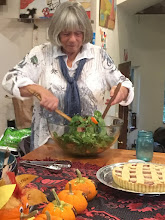NB: This essay was written several decades ago. Nothing I say here should be taken as indicative of what Bend, Oregon, is like today.
One of my lectures, during my ten years as a Chatauqua lecturer with the Oregon Council for the Humanities, was on the meanings of food: transformative, cultural, communal, religious. When I was invited to give the lecture in Bend, Oregon, Eileen, one of the organizers, suggested I meet her for dinner before the lecture. We would eat, she said, in a restaurant new to Bend that she was curious about.
Having dinner with Eileen was something like dining with M. F. K. Fisher. A student of Bend's Culinary Institute, Eileen was about my age, had studied the chemistry of Japanese cooking in Japan, and had a degree in organic chemistry. When it came to food and restaurants, she knew her stuff.
Because I needed to be at the auditorium at 6:30, Eileen had arranged for us to be seated at 5:00, half an hour before the dining room actually opened. But when we arrived, the college-age hostess told us to wait in the bar because seating didn't begin until 5:30, eliciting Reichl-like comments from Eileen as we waited. Bend was developing some superb high-class restaurants with really good food, she said. "But," she went on, "the wait staff im these restaurants is not equally sophisticated." She called them immature, referring to their age, of course, but also to their unprofessional approach to waiting tables. "They should put us immediately in the dining room," she said. "They should take our coats, call us 'madam,' treat us like royalty. If Bend is going to have the pretensions of fine European restaurants, it should fulfill them in all ways." She told me that the cook at this restaurant had been brought from Boston. "I don't know why they had to go all the way to Boston," she said, leaving unsaid that the Culinary Institute surely turned out equally good chefs right there in Bend.
At 5:30 a pleasant but not overly professional server with a part-time job to put her through college seated us in the dining room. Eileen immediately turned over her knife to see if it was washed well.
Looking over the menu, Eileen said it was pretty ordinary with nothing especially exciting or original—the same old pastas, chicken, steak, and seafood. "When I go to a restaurant, I always check out the pastas," she said. "Restaurants make a killing on pastas because they're cheap to make, so the prices should be comparably cheaper."
When the food came, I thought my sweet potato purée divine, but I didn't say so for fear of seeming unsophisticated. While we ate, Eileen talked about taking cooking courses with her husband in Europe—the kind, she said, that take place im the kitchen of some Italian grandmother renowned for her cooking. She praised the Culinary Institute and talked highly of the students, mostly high school graduates who had taken the culinary arts program at Bend High School, and especially of Julian, the head of the institute. She talked a lot about Bend—the influx of people with money and class who understood fine dining and would support a good cultural atmosphere but who did not support the schools or other public institutions that create a thriving community. Bend was a small town suddenly thrust into a big-city atmosphere, she said, and was unable to keep up with its new citizenry.
Because of the immature wait staff at the restaurant, I was late arriving at the auditorium for my lecture, though I started on time anyway. While I talked to my audience about food, I kept thinking about the superb meal I had just had at one of Bend's newest high-class restaurnats with a high-class lady who gave me the inside scoop on fine dining.
Next week: "Christmas in Denmark"

No comments:
Post a Comment